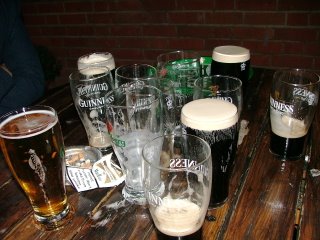
I feel duty bound to point out that I didn't drink all of that.
Having been told by the nice lady on the phone the previous evening that the track would be free from 6PM until 7:30PM, I arranged to meet Kev (who now has a blog all of his very own) and Gareth (who I think of as “enthusiastic”, but Kev very rudely refers to as “loud”) there shortly after six.
Much to our dismay, we were unable to run in the end as the track was covered in some sort of unmoveable, slightly smelly, and largely unsightly organic matter. I think it’s called “students”, but I can’t be sure.
Unfortunately, we had to go straight to the pub.
Needless to say, after a few beers, it seemed like a good idea to head back to the track and see if we could squeeze in a quick race before they closed. Sadly, we were a little too late and not quite drunk enough to avail ourselves of the hole in the fence. There was nothing else for it but to head back to the pub and consider doing the whole thing again next week.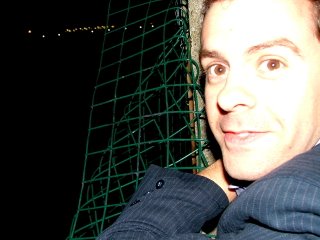
Like some latter day Steve McQueen, Kev reckoned there was a bit of a blind spot.
The plan that was hatched may have been slightly alcohol-fuelled, given that it involved going back next week at exactly the same time. In the cold light of day, it occurred to me that we might encounter the same problems then that we dealt with so pathetically last night.
Another False Start
Posted by John McClure at 8:35 pm 4 comments
Athletics - 800m Preview
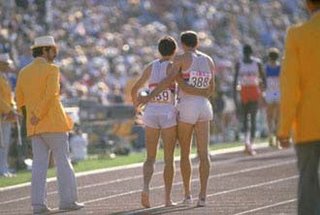
"That was lovely... fancy a Chinese?"
It would seem that the pace of the action around here isn’t quick enough for some people, so in an effort to keep things ticking over, tonight will see a bit of true Ultimate Olympian action – that is to say, some shambolic, poorly thought out, hurriedly executed sport followed by a trip to the pub with Kev from Sobell House.
On the spur of the moment, a gauntlet was thrown down, and tonight Kev and I go head to head over 800 metres at the Iffley Road track, the scene of Sir Roger Bannister’s most celebrated mile. The event was chosen because it’s short enough to not hurt too much (despite a complete lack of training), it’s short enough to not take too long (despite the new licencing laws, the pubs don’t stay open forever you know), and we don’t need any special equipment (like starting blocks).
Probably the most famous 800m race in the Olympics was the final in 1980, when Steve Ovett beat Seb Coe (pictured above pretending to like each other and wearing some particularly fetching gear). Coe had been the favourite to win the 800m and was gutted to only take silver – “There is only one medal that counts. I have to make sure it does not happen again.” – but a few days later, he faced Ovett again in the 1,500m (Ovett’s speciality) and destroyed him.
Tonight, I expect Kev - the Multiple Marathon Man – will be destroying me. I have two goals. The first is, as ever, to run the race in less than double the world record time. The current record is 1:41.11, set by Wilson Kipketer in 1997, so I’ll need to complete two laps of the track in less than 3:22.22. I think that’s possible. The second goal is to avoid getting lapped. I might struggle with that one.
Posted by John McClure at 11:49 am 0 comments
"You're gonna need a bigger boat..."
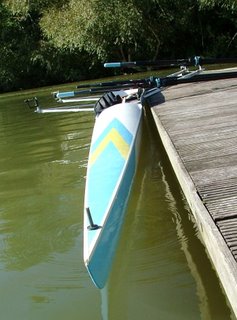
A few weeks ago, when I first met Tom and Nick from the Hinksey Sculling School, they warned me that sculling is addictive. They warned me that it was a hard thing to just try once and then cast aside. I’d be drawn to it, they said. I ought to be careful, they said. From the outside looking in, I admired their love of their sport, but I didn’t believe a word of it.
To me rowing (and sculling) was all about power. The bigger man wins. Yes, there is technique involved, but if you’ve trained harder and lifted more weights, you can make up for deficiencies in technique in a way that a technically gifted lightweight could never counteract.
On Saturday, for the first time, I got into a proper boat and headed out on the river. It didn’t take long before I realised how wrong my preconception about power was, and how right Tom and Nick were about the addictiveness of the sport.
The boat (pictured above) was a double scull. As I climbed down into it I felt the same disconcerting wobble of boat-on-water that I had previously felt climbing into a racing kayak in Nottingham last April.
Nick sat behind me in the front of the boat (if you can figure that out) and we pushed off. He explained how to keep the boat stable - hands in front, like Marcel Marceau climbing a ladder that isn’t there, left hand slightly above right - and demonstrated how the slightest lifting of either hand would make the boat tip to the opposite side.
Having established how not to fall in, and run through some light jargon (every sport has its own little language, littered with shibboleths to distinguish those in the know from those in the dark), we set off up the river.
I say we set off – really, Nick set off as I balanced the boat with my newfound blade (not oar) skills. A short dash down the river later, Nick decided he’d had enough of doing the hard bit and started talking me through how to scull.
What I did was very basic. The seat is on runners, but my legs were to remain locked straight throughout our session. At first, I wasn’t even moving from my hips, just using my arms, and the notion of flattening the blades on the way back wasn’t even entertained. Despite all that, there was a definite thrill involved in being the one powering the boat.
I learnt both my lessons (about power and addiction) almost simultaneously. I quickly realised that all the power in the world (and therefore, a lot of the time I’ve spent recently on the rowing machine or lifting weights) is entirely useless if you don’t know how to apply it. And I clearly didn’t have a clue.
Then, as I felt around with my blades, and splashed, and dug too deep, or missed the water altogether, suddenly, from nowhere, a perfect stroke. Both blades entered the water at the same time, dug just deep enough to get the maximum pull, without digging too deep and causing the boat to lean to one side, and then both blades exited the water together and ripped back, half an inch off the surface, ready to do it all again.
And I was hooked.
Most of my sporting understanding is filtered through golf. The same phenomenon exists there. A complete novice can lift a golf club, waft it around a bit, and if he or she is very unlucky, catch one absolutely flush and be addicted for life. The essence of the addiction is frustration. A glimpse of perfection is granted, but only for long enough to make you feel the need to search for it forever.
Rowing is a sport, like golf, where repetition is key. Above a certain level the difference between one person’s best and another person’s best is irrelevant. Instead, it becomes about who can reproduce their best most frequently, and (crucially) reproduce their best when it really matters.
Redgrave may not have been technically the best rower - or indeed the strongest, or the fittest - but he had in spades what others lacked. He had the ability to deliver his best at the critical moment.
It is the fact that you can sit in a boat for the very first time and produce (entirely by accident of course) something close to a Redgrave stroke that makes rowing addictive. I can watch Zidane with a football at his feet and admire the beauty of it, but can never know how it feels to do what he’s doing. I can watch Federer hit shots on a tennis court that make the hairs on the back of my neck stand on end, but I can only admire it, never experience it.
It goes without saying that I could never attain the Olympic heights scaled by Sir Steve, but at least I can taste it, just for a moment. I can’t decide yet if that taster is a wonderful thing or the dangerous early stages of a crippling addiction. This challenge is going to be hard enough to complete without having to spend time in rehab.
Posted by John McClure at 10:58 am 1 comments
Scull, scull, scull your boat...
Having spent last Saturday morning zipping up and down the river in a small skiff watching children as young as nine making sculling look incredibly easy, I’m heading back to the Hinksey Sculling School tomorrow to show them a thing or two about how to handle a long, thin boat.
I’m encouraged by how stable the youngsters looked in their single sculls, or at least I was encouraged until Tom (expert coach) pointed out that their centres of gravity are somewhat closer to the waterline than mine is going to be. One doesn’t so much sit in the boat as on it – or next to it in water up to my neck as will most likely be my innovative approach.
There will be no event completion tomorrow – we’re still at the stage of getting me into a boat to see how much work there is to be done before we can go to a proper racing lake to record some times – but I’m looking forward to it. Mostly.
One thing I’ve learnt so far in the course of trying Olympic events is that the more ardently the experts insist that their discipline is "easy to learn but difficult to master", the more likely I am to get either hurt, wet, or both. In April last year, Shaun Cavern, flatwater kayaking guru extraordinaire, kept telling me that his discipline was simple, right up to the point where I was disappearing into the Trent.
The next day, Ian Raspin, slalom kayaking guru extraordinaire, was saying exactly the same thing, even as he was saving me from drowning.
It’s slightly disappointing therefore that Tom Collins, sculling guru extraordinaire, has punctuated nearly every sentence he has spoken to me since we met with the expression "it’s really very easy." For now, I believe him - the kids last week certainly made it look so – but by lunchtime tomorrow, I might be singing a different tune.
Posted by John McClure at 12:30 pm 3 comments
Treadmill Tapdance
All work and no pointless sport make John a dull Olympian. I’m hoping that will all change in the near future - I’ve finished a large project at work that has been hanging over my head all year, and some tentative visits to the gym of late have confirmed that whatever was wrong with my (supposedly ‘good’) knee seems to have gone away again.
In the meantime, to give you a flavour of how I like to dress and behave in the aforementioned gym, here is the video for OK Go’s single Here it Goes (with thanks to all the people who saw it, thought of me for some reason, and e-mailed the link).
Next week, The Kings of Leon Greco-Roman wrestling.
Posted by John McClure at 8:15 am 6 comments
The Deep End

As you can see, I have been working very hard at the Olympic challenge since we went swimming four weeks ago…
Unfortunately, the “working very hard” bit is true, but sadly I’ve not been working on anything as interesting or fun as all of this. I was also away for a few days playing golf in Holland. Two things of Olympic note occurred while I was there.
The first I’m hoping might not be as much of a problem as it felt like at the time. As I walked onto a tee box, my left knee (the “good” one) made a popping sound and suddenly I couldn’t straighten it (stop me if this is starting to sound familiar). I wiggled it about a bit, there was another pop and everything seemed back to normal. I strapped it up for the rest of the trip and favoured the other leg (”There's a lot of it about, probably a virus, keep warm, plenty of rest, and if you're playing football or anything try and favour the other leg.”).
Then, the morning after I got home, I climbed out of bed only to have it pop out of place again (the knee, not the bed). This time it took me half an hour (and rather more wiggling than I really like to start the day with) to get it back into place; by the time I did, the joint had filled with fluid and it hurt like hell.
Three days working from the sofa with my leg elevated, covered in ice and an assortment of frozen vegetables, seemed to do the trick. The swelling went down, the pain it was causing subsided, and the limp became less Douglas Badder and more Huggy Bear. Now, the limp is gone, the knee feels fine, and last night I even ran about 50 yards at a fair lick to catch a bus.
All of which sounds great, but I’m still feeling a bit like I'm walking around on a time bomb that could have me back in the hospital again at any minute. At least I’d know the drill I suppose.
The other thing of note that occurred in Holland was more of a realisation than an injury (for a change). As I mentioned, I was playing golf, a game I’ve played since I was old enough to draw breath. At one stage in my life I even got reasonably good at it.
These days I’m diabolically bad. There is the occasional flash of something encouraging, but really, when you’re stumbling about in the dark, an occasional flash tends to be more disorientating than helpful.
The thing is, I used to care. I used to get really quite upset on the golf course about how bad I had become. I would break clubs and unleash vitriolic streams of very unsavoury language in the aftermath of a really bad shot (of which there were many). I made a decision a couple of years ago after a particularly embarrassing outburst that I was not only ruining the game for myself, but also making the people I was playing with rather uncomfortable. It had to stop.
I’m delighted to say that it has stopped, and while I was away in Holland my golf was so bad (and I was so far out of contention) that I had plenty of time to think about why it has stopped, and why I’m now wandering about the course like the Dalai Lama ("Big hitter, the Lama") instead of Happy Gilmore.
In the space of a month I had played incredibly badly (even for me) in a tournament in Northern Ireland in front of a bunch of people I used to consider my peers, and then there I was walking around a course in Holland with half my old university team, all of whom had left me for dead by the end of the first nine on the first day. I should have been spitting with rage.
Finally I realised what has made the difference, what has stopped me getting cross, and consequently let me enjoy playing again (or at least enjoy it more than I have done for a while). It’s failure. It’s being rubbish at things. Perhaps most importantly, it’s failing and being rubbish on a regular basis. In short, it’s this challenge.
By forcing myself to try things that I think I can’t do (but sometimes surprise myself with – the BBC’s coverage of this year’s London Triathlon was on TV last week and I watched it with a renewed sense of disbelief that I made it round last year), by constantly putting myself out of my comfort zone, and by having to rely on a lot of help from a lot of people, I’ve come to enjoy trying things, even if I don’t succeed.
As I’ve mentioned previously, that’s what the Olympics are supposed to be all about – trying your best (no matter what Sean Connery had to say in The Rock about "losers" who say that) and not worrying too much about the outcome.
It would seem that the deep end is my new comfort zone, which should make this little lot a piece of cake, right, Ben?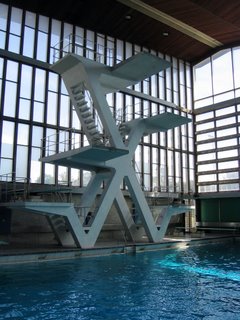
(with belated thanks to my synchronised diving partner for the photos)
P.S. Also thanks to Ben, here's some video footage. Ben, you're either a bad typist or a comic genius - "Ultimate Olumpian"? I might run with that from now on.
Posted by John McClure at 1:03 pm 2 comments
Swimming Pictures
Rather than weave these into the previous post, I thought I'd save you all the trouble of going looking for the shots of me and the boys in our swimming trunks. Brace yourselves.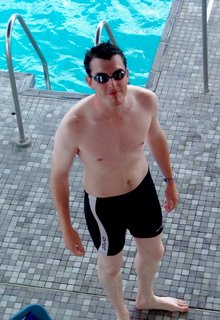
Fighting fit and ready to go - three days later and the only bit of me that's still sore is the bridge of my nose - note to self: don't buy new goggles the day before you go for a 3 hour swim session. With feet that big, I should have been quicker. Still, nice tan, eh?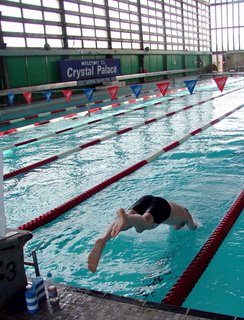
Not unlike Eric Moussambani, my diving wasn't ideal. I think I spent the first twenty metres after this one trying to work out if I was in too much pain to continue with the race. I braved it out in the end. I know they're closer to the camera than the rest of me, but I've never noticed just how ridiculously big my feet are. Sideshow Bob-tastic!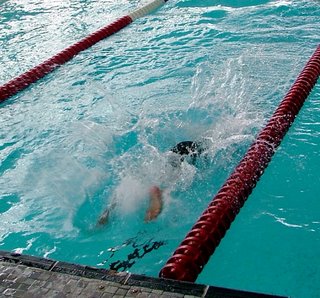
Introducing Mr David Hockney on Fuji Finepix... nice work, Mr H.
They say the camera never lies, but I assure you I was trying a lot harder than this photo makes it look like I am. The vent on the right of shot is where they let the sharks out when you're not looking.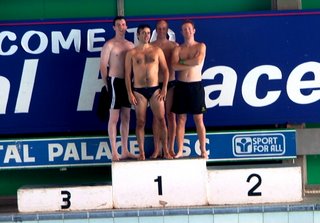
The relay team of the gods - from left to right: Mildly Embarrassing McClure, Doggy Paddle Diogo, Iron Mike Butterfly & Blistering Backstroke Ben. I can assure you that the pool at Crystal Palace is not on a slope - the only man we could find to take our picture had a worn down wooden leg.
There is some video to come, but I'm still working on the technical glitches.
Posted by John McClure at 10:39 pm 2 comments
Eight Events in One Day
 Thorpedo in the Water!
Thorpedo in the Water!
Usually, before I do an event, I write a preview. On this occasion, I was pushed for time; but I was also planning to attempt eight (swimming) events in one day, so thought eight previews might be a little much. I know, however, that a certain other John likes a good preview, and it was his birthday last week, so rather than disappoint him altogether, I thought I’d mash the previews through the review and see how that comes out. Probably as the longest blog entry in history – brace yourselves.
Swimming is one of the Olympic sports in which I have a hero. For my money swimmers don’t get anything like as much recognition as they should – I suppose they’re too anonymous when they’re in the water, or maybe people just don’t understand how incredibly fit and dedicated the best ones are.
My swimming hero hasn’t been my swimming hero for very long, but I can’t conceive of anyone ever being able to replace him at the top of the list (which roughly, from second place, pans out: Thorpe, Moorhouse, Phelps, Goodhew, Eric “The Eel” Moussambani).
He has won eight Olympic medals (4 gold, 2 silver, and 2 bronze), nine World Championship medals (3 of each), and sixteen European Championship medals (8 gold, 3 silver, and 5 bronze); and yet, the chances are, you’ve never heard of him. He holds 14 British records, 8 European records, and 7 world records. He is Sascha Kindred.
His twin brother, Timo, did the triathlon with me last year. Like Timo, Sascha’s an impossibly nice man. Unlike Timo, Sascha has cerebral palsy. They’d both kick your ass in the pool – on Saturday, I went to Crystal Palace to have a go in a 50-metre pool, clock my times, and find out by how much.
My day began at 06:30 – usually, if I see this time of the day, it means I’ve had a great night out and it’s time to get some rest, but today it heralded something that I believe is referred to as ‘Saturday morning’. It was a shock to discover that the world not only exists, but also manages perfectly well without me before lunchtime at the weekends. I gathered my thoughts, and my high-energy foodstuffs, and headed to London on the bus with Michael and Diogo.
We arrived at the Crystal Palace National Sports Centre (which, for all the signposts it doesn’t boast, ought to be renamed the Crystal Maze National Sports Centre) by about 10:30, in time to meet Ben, the fourth member of what would prove to be a remarkable relay squad.
We paid our money and made our way into the depths of the swimming pool complex. The whole place is like a man who has been living alone for too long – it’s a bit frayed at the edges, nothing is quite as clean as it ought to be, and there’s a funny smell that you don’t really want to inhale for long enough to be able to describe.
Despite all that, the sheer scale of a 50-metre swimming pool is impressive when you are used to training – all right, when you occasionally swim – in a 25-metre one. It looks big, but somehow, it also looks manageable (appearances, it later turned out, can be deceptive). Perhaps what made it seem manageable was the constant spectre of the 10 metre diving platform, which seemed anything but manageable, lingering behind us throughout.
We weren’t there to dive though – we’d been told we couldn’t without being part of a club or receiving instruction (which costs an arm and a leg; ironic, given that these are exactly what you might lose if you tried it without help) – but both Ben, who has agreed to be the other half of the synchronised dives, and I could hardly look away from the diving pool throughout the 3 hour swim session.
By the end, I think we had convinced ourselves that the 3 metre springboards present no real problem, but that even the steps up to the 10-metre board look frightening, especially when you consider how tricky they might be to negotiate backwards with your tail firmly planted between your legs – never mind trying to do all that in time with your partner.
But I digress – the mission on Saturday was in the other pool – eight events in one three-hour session.
Event 1 - 200m Freestyle
Ian Thorpe’s World record – 1 minute 44 seconds
My time – 4 minutes 24 seconds
% Olympian – 40%
The first thing to note about freestyle is that, as the name implies, the swimmer can use any style he or she likes, and touch the wall with any part of the body at the turns and the finish. This was one of many useful little titbits I picked up from Dave Wallechinsky’s excellent book last night, and would come in very handy during this first event.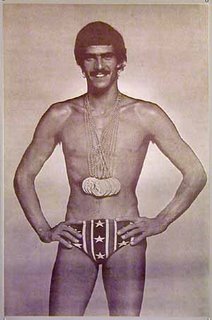 Mark Spitz - how much faster might he have been without the 'tache?
Mark Spitz - how much faster might he have been without the 'tache?
This event was Mark Spitz’s third of seven gold medals at the 1972 Munich Olympics. The winner in the 1988 games was the largely unfancied Duncan Armstrong of Australia. He beat the mighty Matt Biondi into third place, breaking the world record in the process, by using a rather ingenious tactic. He was assigned lane 6, with Biondi inside him in lane 5. At his coach’s suggestion, Armstrong swam as close to Biondi’s lane as he could for the first 150 metres - “I just sucked into his trough and bodysurfed the first 100 metres” – before slingshotting his way to the front with 20 metres to go.
My race plan was slightly different, and based rather more loosely around the notion of not drowning. I dived in and felt very good for 20 metres, despite the absence of Matt Biondi in the next lane. I was breathing every two strokes and felt comfortable. Then I felt a little short of breath, so I switched to breathing with every stroke. Then I realised I wasn’t even going to make it to the end of the pool if I didn’t switch to breaststroke. Which was quite embarrassing. In the end, I touched home in a time of 4 minutes 24 seconds. Which was also quite embarrassing. Thorpe could have swum twice as far in the same time, and still have had time to get out and throw a couple of shrimps on a barbie in the time it took me.
Event 2 - 4 x 100m Freestyle
South African World record – 3 minutes 13 seconds
Our time – 6 minutes 51 seconds
% Olympian – 47%
Coming into the 2000 Olympic final, the USA had won this event every time it had been held. Despite being 6 tenths of a second down with 50 metres to go, and having won the 400m individual freestyle less than an hour earlier, a 17 year-old Ian Thorpe swimming the anchor leg for Australia somehow managed to overtake Gary Hall of the US to claim the first ever non-US victory for Australia… in Australia. There’s a rumour a few beers were drunk that night, but I’m not sure I believe it.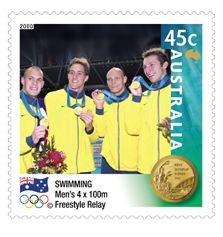 So good they made it into a stamp.
So good they made it into a stamp.
This event afforded me some help, in the shape of three other swimmers. Despite Michael’s best (and very impressive) efforts, we still didn’t manage to sneak inside the double-the-world-record pace we had tentatively set as a target in each event. It probably didn’t help that I was still doing breaststroke.
Event 3 – 100m Breaststroke
Brendan Hansen’s World record – 00:59.30
Sascha Kindred’s World record – 01:22.98
My time – 1 minute 58 seconds
% Olympian – 50% He never wanted to be a swimmer for a living; he wanted to be... a LUMBERJACK!
He never wanted to be a swimmer for a living; he wanted to be... a LUMBERJACK!
Duncan Goodhew fell out of a tree when he was 10 years old, an accident that caused him to lose all his hair, which never grew back. Bullied at school for being bald and dyslexic, Goodhew went to Moscow in 1980 determined to raise two fingers to his juvenile detractors by winning a gold medal as shiny as his head. He won the final by four tenths of a second.
As a twelve year-old, Adrian Moorhouse watched David Wilkie win a gold medal in the 200m breaststroke and was inspired to start training in earnest. In 1984, he swam a disappointing final and finished fourth. While he was still in Los Angeles, he got a telegram from his old Sunday school teacher – “Very bad luck, all proud of you. There will be a next time.” – which he kept and later tucked into the box that contained his gold medal from the 1988 games.
This event is one I finally felt reasonably comfortable with throughout. I saved a bit for the finish and just about managed to scrape inside the target time. I was growing increasingly tired by this point however. It’s all very well not eating before you swim, but it doesn’t do much for the energy levels.
Event 4 – 4 x 100m Medley
US World record – 3 minutes 30 seconds
Our time – 8 minutes14 seconds
% Olympian – 43%
This event wasn’t on the list for this trip, but Michael took me aside and uttered in a hushed and confidential tone that he might be able to do 100 metres of butterfly if I wanted to try for the medley relay. With Ben having shown himself to be an expert backstroker, and Diogo kind enough to let me do the breaststroke leg (is it just me, or is this sport riddled with innuendo?), in true Ultimate Olympian style, we jumped at the chance to have a go at something unplanned.
Ben led off with an expertly executed backstroke leg. I followed up with an average breaststroke leg, but all was really just preamble to Mighty Michael (as he shall henceforth be known) and his butterfly leg. He swept away from the start like some over-excited (and possibly slightly epileptic) dolphin – which sounds bad, but actually that’s just what perfectly executed butterfly looks like. The three of us watched in awe as he turned and just kept on coming. He was tired when he finished, but it was, all sarcasm aside for once, one of the most impressive sporting things I’ve ever seen.
Diogo brought us home with some mighty fine freestyling, someone noted down the time, but I don’t think any of us cared – we’d witnessed something a bit special, no matter how long it took.
Event 5 – 200m Breaststroke
Brendan Hansen’s World record – 2 minutes 9 seconds
Sascha Kindred’s World record – 2 minutes 56 seconds
My time – 4 minutes 29 seconds
% Olympian – 48%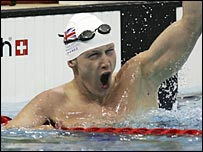 Sascha Kindred - collector of world records.
Sascha Kindred - collector of world records.
In 1976, 12 of the 13 men’s swimming events were won by the USA. The only one that wasn’t was won by Scotland’s David Wilkie who set a new world record and became the first British swimmer for 68 years to win an Olympic title (and, in so doing, inspired a young Adrian Moorhouse).
My ambitions were slightly lower. Despite the encouragement of Ben, Diogo and Michael as I came to the finish, I didn’t quite manage to be half an Olympian. There’s video of this one, but you’ll have to wait a day or two while we work out how to rotate it through 90 degrees so you can see it!
Event 6 – 4 x 200m Freestyle
Australia’s world record – 7 minutes 4 seconds
Our time – 16 minutes 55 seconds
% Olympian – 42%
We revised our target for this one to 17 minutes. I think we all thought we were very unlikely to beat that mark when we started, and with the best will in the world, Diogo, Ben and I were a little glum as Michael set off for the final leg with 14 minutes already elapsed. Halfway through his final length, I started getting excited. If he didn’t tie up in the final 25, there was a chance we might do it… all right, there was a chance Mike might do it for us. In the end, he didn’t even make it tense, swimming a final leg of 2 minutes 55 seconds to see us smash the mythical 17-minute mark. The man’s a machine.
Event 7 – 50m Freestyle
Alexander Popov’s world record – 21.64 seconds
Sascha Kindred’s British record – 33.06 seconds
My time – 61 seconds
% Olympian – 35%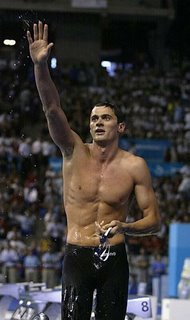 Excuse me, Mr Popov - how many Olympic medals did you win?
Excuse me, Mr Popov - how many Olympic medals did you win?
Re-introduced in 1988, the 50m freestyle inspired one of Olympic swimming’s great rivalries. For the best part of 15 years, Matt Biondi and Alexander Popov traded titles and world records like men possessed. Very exciting it was too, but my favourite 50m freestyler is Samson Ndayishimiye of Rwanda who, in the games of 2000, was the slowest competitor (recording a time of 38.76 seconds). The highlight of the games for him was swimming in a clean pool that was two and a half times longer than the dirty hotel pool he had trained in.
Having recorded a 57 second split in the first half of my 100m breaststroke, I was confident I could beat the minute mark in this one. If I’d done breaststroke, perhaps I would have done, but for some reason I stuck to crawl, despite tying up like Houdini in the final 10 metres and missed the minute mark by the narrowest of margins. I’d stopped being embarrassed by that stage. I was just tired.
Event 8 – 100m Freestyle
Pieter van den Hoogenband’s world record – 47.8 seconds
Sascha Kindred’s PB – 1 minute 13 seconds
Eric “The Eel” Moussambani’s time in Sydney 2000 – 1 minute 52 seconds
My time – 2 minutes dead (which is what I nearly was by the end)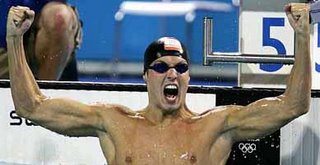 Pieter van den Hoogenband - Holland's aqua-weightlifting sensation.
Pieter van den Hoogenband - Holland's aqua-weightlifting sensation.
There was much mocking of Eric the Eel at the start of the session. How we laughed at his unfortunate attempt to qualify for the latter stages of the 2000 games! How we slowly stopped laughing so much as we realised I hadn’t a snowflake’s chance of beating his time.
Eric arrived in Sydney expecting to swim in the 50m event, but his coach decided at the last minute that he should do the 100m instead. Good in theory, but the fact that Eric had never swum that far in one go before in his life might have given him pause. Eric’s heat contained just three swimmers, but when the other two both produced a false start and were disqualified, Eric was left to swim the heat alone against the clock.
Despite a slightly bellyflopped dive into the pool and swimming with his head above the water, he somehow nailed the first 50 metres in under 41 seconds, but he’d used up just about all his energy and the second lap became the stuff of legend. 5 metres from the finish, despite his continued thrashing, Eric stopped moving forward. Exhausted, disorientated, and probably mildly embarrassed, he was essentially treading water. The officials thought about stepping in.
Then the Sydney crowd came to life and adopted themselves a new hero. Their bellowing and encouragement somehow carried him to the finish. His time was more than 40 seconds slower than the next slowest participant’s, and seven seconds slower than Pieter van den Hoogenband’s winning time in the 200m event.
It was funny to watch, and you loved him for it. You loved him even more when you later read that having waved shyly to thank the crowd, Eric went back to the changing rooms and cried.
To his credit, inspired by the subsequent kindness shown to him by the public and many of the elite swimmers, Eric stuck at it and, in the 2001 World Championships, recorded a time in the 50m freestyle of 31.88 seconds.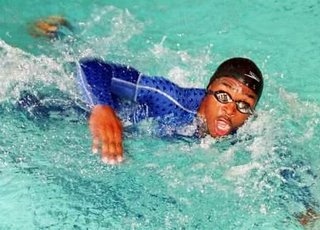 Eric Mousammbani - not the fastest, but comfortably quicker than me.
Eric Mousammbani - not the fastest, but comfortably quicker than me.
There’s some video here – with commentary in French especially for the Dubrannas.
Alexander Popov was somewhat better than Eric. After Popov won the 1996 100m freestyle (his second successive gold in that event) an American reporter asked him to name his favourite actor or actress. “This is an American question,” snapped Popov. “I don’t dream about actors and actresses. They should dream about me. I am reality, they are not.” Ironically, he had just become the first repeat winner of the 100m freestyle since Johnny Weissmuller, who you probably know better as the actor who played Tarzan.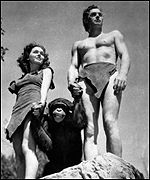 Johnny Weissmuller (with his wife and his coach).
Johnny Weissmuller (with his wife and his coach).
And so we reach the end of this titanic blog entry. Its length is related to its subject, and I’m hoping that by the time you get to this point (if you do) that you’re as tired as I was when I finished those eight events.
Now, if I can just knock off another 5 events quickly, there will be less than a hundred left to complete!
Posted by John McClure at 1:09 am 11 comments
Anyone for tennis?

Yesterday saw the playing of two very important tennis matches. One of them involved one of the best tennis players I’ve ever seen, playing against a complete no-hoper from Oxford; the other was between Roger Federer and Tim Henman. The results weren’t entirely dissimilar.
I have a rough rule of thumb that any sport for which a gold medal at the Olympics is not the ultimate achievement in the sport ought not to be in the games. This rule certainly applies to tennis, which was included in the first modern games of 1896, but then dropped after the 1924 games, only to return in Seoul in 1988.
That said, there are a few entertaining stories from the history of the men’s singles tournament.
John Pius Boland (who later became an MP and ardent proponent of Irish independence) was a student at Christ’s College, Oxford in 1896. He went to Athens on holiday and to watch the first modern Olympic games. At dinner in his hotel one night he met a Greek man from Egypt who was playing in the tennis tournament and persuaded Boland to enter too. As chance would have it, they met in the final. Boland considered forfeiting the match, but in the end thought better of it and turned up to beat his new friend 6-2, 6-2 and become the first Olympic tennis champion.
In 1906, by virtue of three walkovers, a Dutchman called Guus Kessler made it all the way to the semi-final round, where he lost 6-0, 6-0.
The 1908 title was lifted by Arthur “Wentworth” Gore who remains the oldest person ever to have won a Wimbledon singles title (aged 41, in 1909) and the oldest person ever to play in a Wimbledon singles final (aged 44 in 1912). In fact, he played in every Wimbledon tournament that was held between 1888 and 1927. Perhaps Tim Henman can take comfort from the thought that Gore won the title 21 years after first playing in the event.
In the Olympics of 1948 and 1952, an Iranian boxer, Emmanuel “Mike” Agassi lost in his first fight both times. In 1996, his youngest son, Andre, won Olympic tennis gold in Atlanta, beating Sergi Bruguera in the final 6-2, 6-3, 6-1.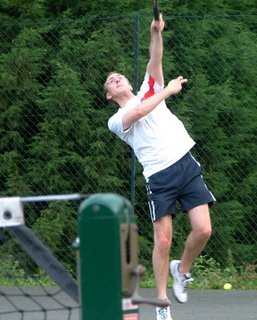
Gareth manages to serve and give me the fingers at the same time.
I wasn’t quite as bad as Guss Kessler last night, but it was a close run thing. Gareth is easily the best tennis player I know. He’s also a lot more competitive than he pretends to be. I could tell it rather annoyed him (even if it didn’t remotely worry him) when I broke his first service game. At 1-1 in the first set, I was feeling pretty good. It was all rather downhill from there.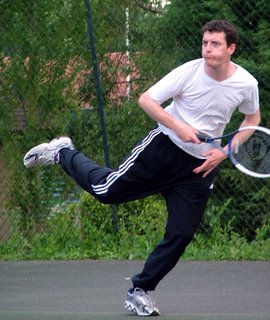
Dizzy Gillespie playing the trumpet.
The photos (thanks, Mike!) later revealed that I blow my cheeks out like Dizzy Gillespie hitting a high note every time I hit the ball. I’ve no idea why I do that – I certainly don’t try to – but even once our esteemed photographer had pointed it out mid-game, I couldn’t stop doing it. Or thinking about the fact that I was doing it.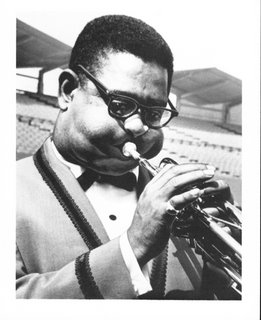
Me dealing with a tricky backhand, in D flat.
Perhaps it was this mental lapse, or possibly Gareth’s considerable talent advantage, that led to me losing the first set 6-1 and the second 6-0.
My first encounter with tennis was watching Wimbledon with my mother – who, for two weeks every summer, becomes the most ardent tennis fan imaginable. She wept when Ivanisevic won in 2001. But then, so did I. And so did he. I’m choking up now just thinking about it.
My first racket was given to me by my father (I’m not sure how old I was) when he came back from a trip to Belgium armed with a pair of Donnay rackets – a small one for me, and an even smaller one for my sister. Largely, while mum was glued to the television and enraptured by Dan Maskell’s exceptional commentary for those two weeks, Caroline and I were in the garden winning Wimbledon ourselves over and over.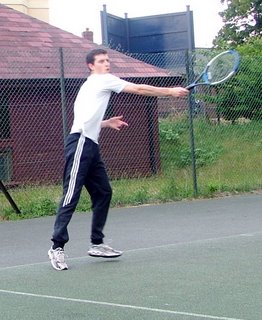
I must have been running out of puff by then.
Having decided that it was a sorry state of affairs that I no longer owned a tennis racket (and that I’d been unable to borrow one from any of my friends), at lunchtime yesterday I went and bought myself one. For £28, I didn’t think I’d be getting much worth writing home (or in one’s blog) about, but it’s an incredible piece of kit.
Fully strung, it weighs just over 300 grams – that’s less than a can of coke – and, even though I didn’t demonstrate it much when we played, it feels capable of great things. As the third set marched on to the same tune as the previous two, my new purchase had its moment of glory.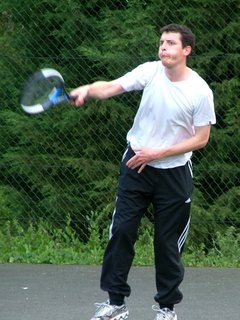
It may have been a moment of glory, but I still looked like Loius Armstrong trapped underwater when it happened.
0-2 down, and serving at 30-15, it produced an ace to Gareth’s (left-handed) forehand. This was exciting on several levels. For one thing, it was one of only a handful of first serves with which I managed to hit the court (let alone the service box); for another, it gave me two game points; but most importantly, it put me ahead in the ace count, 1-0.
I went on to win the game (my second and last of the match), but Gareth had new worries, and the final games became all about him trying to ace me, and me trying my best not to be aced. In what looked likely to be his final service game (at 4-1) he put what was likely to be his final first-serve (at 40-15) into the net. I secretly smirked.
Then he aced me (quite beautifully) with his second serve. The final game of the match consisted of me trying to ace him with every (first and oh-so-inevitable second) serve, so he won that to love without hitting a shot and the match was all over. Just as in the badminton a little less than two years ago, he had beaten me quite soundly.
Tennis may or may not belong in the Olympic games – and it’s a frustrating game for two people of differing abilities to play against each other – but last night was a lot of fun, and I’m delighted to report that my knee withstood not only the tennis, but also the moment of madness that saw Gareth and I have a 400 metre race round Bannister’s track on our way home (he won that too by the way – Gareth, not Bannister - by about 50 metres).
Result of Tennis - Men’s Singles
Gareth Forber (GBR) beat John McClure (GBR) 6-1, 6-0, 6-1
Posted by John McClure at 12:37 am 4 comments
Le Plus Important...
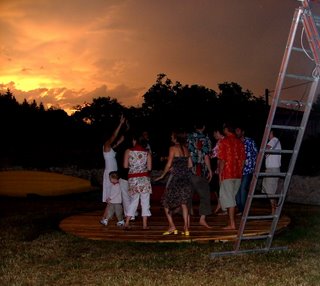
An unlikely setting for an epic sporting encounter...
Having played a leading role in most of my convalescence, it was probably fitting that alcohol should once again have been involved in what I hope was the final stage. At five-thirty on Sunday morning, after a French wedding that will live long in the memory, all the necessary elements for recovery finally aligned.
It takes a clever friend with a very special brand of madness I can’t resist to understand that, after a wedding and when everyone else has gone to bed, the best possible thing to do is play badminton in the garden under floodlights until the sun comes up – that kind of thing seems obvious to me, and infinitely preferable to anything as mundane as sleeping, but surprisingly, we were the only players.
Badminton evolved from an Indian game that had no rules or defined playing area. There was no winner, just one, simple, shared objective – keep the shuttlecock in the air. It adhered perfectly to the Olympic ideal that values taking part above winning.
We played in the spirit in which the game was invented, across what had earlier served as a homemade dance floor. Neither of us scored a point, but I doubt we could have made more effort had it been an Olympic final.
I leapt for high shots, I lunged to retrieve the short and wide ones – I even managed to break a racket (pardon, Nico!) trying to retrieve a shot that flew a little too close to the marquee – and all without a single twinge in either my knee or my competitive spirit.
Later in the day I took a walk, half expecting my knee to be stiff, but if anything it felt better. I tried running a couple of hundred metres. It hurt a little, but then so did the other one; it’s been a while, and I wasn’t wearing running shoes.
I’m writing this as I sit on a train on my way back to the UK. I hope that tomorrow I’ll find an hour after work to go to the gym and move the knee-recovery process on. Who knows? Maybe I might even find the time to do some events before the end of the summer and you can all start reading about something other than the wretched state of my health.
The regular (frequently disappointed) visitor to this site will know that, in addition to being injured, I have been rather lazy recently. As ever, the excuses are legion but dull. I have been in need of some inspiration (I even thought about taking another trip to Ikea), and this weekend it has arrived with a vengeance.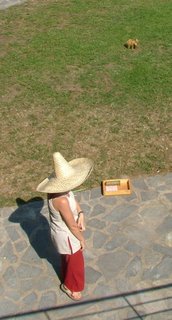 All weekend, I played games as they should be played - trying to win, but too busy enjoying the attempt to worry about whether or not it was successful. Sport provides a vehicle for making new friends and basking in the warm glow of old ones. Put a man in a garden with a small child and you have a man and a child looking at each other awkwardly; add a ball to the equation and suddenly there is laughter and play, and later there will be stories: of triumph and disaster, of near misses and moments of brilliance, of mistakes and achievements – of life.
All weekend, I played games as they should be played - trying to win, but too busy enjoying the attempt to worry about whether or not it was successful. Sport provides a vehicle for making new friends and basking in the warm glow of old ones. Put a man in a garden with a small child and you have a man and a child looking at each other awkwardly; add a ball to the equation and suddenly there is laughter and play, and later there will be stories: of triumph and disaster, of near misses and moments of brilliance, of mistakes and achievements – of life.
I played this Finnish game in France with a Mexican bandit. It was that kind of weekend.
***
UPDATE - I didn't make it to the gym last night, but tonight Gareth has very kindly agreed to beat me at tennis. I don't have time to write a preview - if you really need one, tune in to BBC1, BBC2 or BBCi any time for the next fortnight and you'll soon work out what tennis is all about.
Posted by John McClure at 12:18 pm 1 comments
Archery - 70 metre Individual
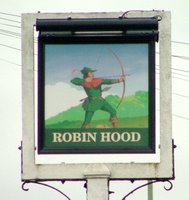 As Will drove us through the wilds of Witney, we passed this pub. The rain was coming down quite hard, but doing nothing to dampen the wind. I suspected the pub might be as close as we would get to anything archery related last night, but thankfully I was wrong.
As Will drove us through the wilds of Witney, we passed this pub. The rain was coming down quite hard, but doing nothing to dampen the wind. I suspected the pub might be as close as we would get to anything archery related last night, but thankfully I was wrong.
After some initial confusion when we arrived at Witney Rugby Club about where exactly the archers were hanging out (there was some sort of caravan convention being held on one of the pitches), we eventually found a couple of members of the Windrush Bowmen (a number of whom later turned up and were clearly women).
People in clubs tend to be either incredibly welcoming and eager for you to join in whatever it is they’re doing, or incredibly aloof and eager for you to go away. I’m delighted to report that the Windrush Bowmen (and bow-women) were all very firmly of the former persuasion. Within ten minutes of finding them, I was handed a target frame and told to follow the man with the tape measure while he very exactly measured out the 70 metres we needed.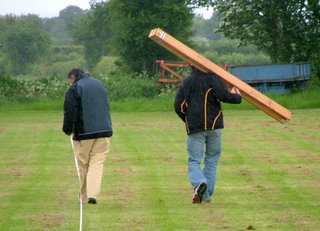
The rain came and went, but the wind persisted as this same man gave me a very rough idea of what to do. I shot a couple of arrows into a target that was only ten metres away to give me a feel for what I was doing. I assume doing so was also designed to be an exercise in confidence boosting; if it was, it nearly backfired horribly as my second arrow only just hit the target.
Having established that the sights on the bow were essentially meaningless at this stage, as I’d probably miss the long target anyway, my mentor decided I should get on with it and give them all a laugh. I think he was a little surprised when my first three arrows only missed by feet instead of yards. The gentle mocking turned to gentle encouragement as we walked down to retrieve them (from the ground).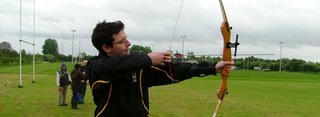
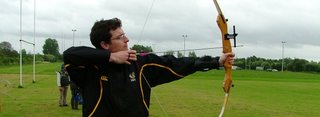
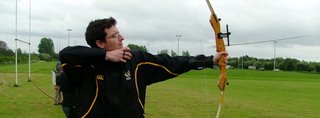
My fourth shot was dead straight (“as an arrow” in fact), but missed slightly high. My fifth shot, however, hit the target and I may have yelped ever so slightly. By this stage, I could no longer really see properly for all the rain on my glasses, so it was the noise the arrow made as it hit that produced the little yelp of triumph. The sixth shot missed high again, but I didn’t really care by then. I walked, rather faster this time, down to retrieve the arrows and to see how many points I’d scored.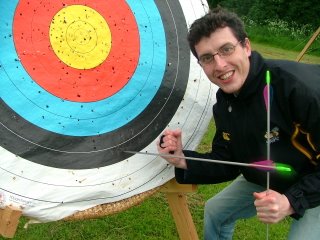
The grapefruit was safe, in fact, you could have nailed a prize-winning marrow to the target and it would have survived unscathed, but I’d hit the outer black, and that’s worth three points. I trotted back to the other end, almost oblivious to the rain, to shoot what I promised the patient Bowmen would be my last three arrows.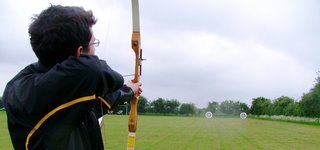
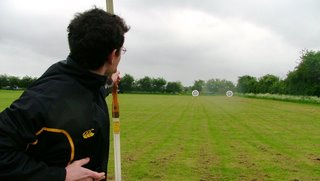
I missed with all three. The wind was getting up, the members of the club were waiting to use the range, and the rain just wouldn’t go away. It was time to call it a day. Somehow, the photos make it look like it was a reasonably pleasant evening weatherwise. It wasn't. For a bit of archery footage, and some indication of how strong the wind was, take a look at the video.
I scored three points with my nine arrows. Assuming that I had gone on scoring at the same rate (which, as assumptions go, is reasonably heroic) for the full 72 arrows of the Olympic qualifying event, I would have scored 24 points. In 2004, at the Panathinaiko Stadium in Athens, the Korean Im Dong Hyun broke the world record with a score of 687 points (out of a possible 720). That’s a hell of a lot of grapefruits.
Of the fifteen events I have tried so far, archery has shot to the top of the list of things I’d like to try again sometime; maybe next time on a dry, windless, sunny evening.
Massive thanks to the Windrush Bowmen for their hospitality, and to Will for braving the elements and taking such good photos and video footage. I’m off to Scotland for a few days to continue the rehabilitation of my knee by playing one of the finest golf courses in the world. When I get back, I hope to set about finding some other events I can do while my knee continues to improve.
Posted by John McClure at 7:01 pm 9 comments
Archery Preview

Tomorrow, weather permitting, I will be attempting to have a go at archery. The Olympic archery discipline is contested by shooting at targets 70 metres away. As so often, I’m going to turn to Dave Wallechinsky’s Complete Book of the Olympics to set the scene:
Archery targets are four feet in diameter. The bullseye is 4.8 inches across. This is the equivalent of shooting across three tennis courts laid end to end and hitting a grapefruit.
I think we all know from experience how tough that can be. Only this morning my grapefruit had made it almost to the end of the garden before I managed to get a shot off.
Archery made its first Olympic appearance at the games of 1900, but after the 1920 games it was dropped as an Olympic sport for want of a uniform set of international rules; presumably the French turned up having prepared to shoot grapefruits, while the Canadians were adamant they had been told to practice shooting at bananas. The French-Canadians arrived with a quiver full of arrows, a fruit salad, and their newly appointed national coach, Carmen Miranda.
Fifty-two years later, the archers of the world had settled on a set of rules (and a type of fruit) and the sport made a comeback in 1972 at the Munich Olympics.
Archery is one of the events at which I will cheat ever so slightly. It accounts for two of the 136 events I could have a go at – the individual and the team contest – however, as the team event is merely a replication of the individual event, I’m only going to do the latter.
I’m also going to cheat in the same way I did when it came to shooting clay pigeons (or were they kumquats?); that is to say, I am not going to shoot quite as many times as the athletes at the Olympics do. To win an Olympic gold, an archer would have to first shoot 72 arrows in a qualifying round and then win 6 matches of 18 arrows each.
Assuming there was no need for any playoff arrows to be shot in the event of a tied match, that’s a minimum of 180 arrows, and to my mind, that means just one thing. I'm not going to waste everyone's time by reconfirming how bad I am at archery 180 times.
My hosts tomorrow are the Windrush Bowmen, who shoot at Witney Rugby Club. If you’re in the area, I’d suggest you run away as fast as you can just in case I don’t quite get the hang of it from the start.
This will be my first event since the fencing in November. The lay off has been largely due to bone idleness, but I’ve also been somewhat hampered by my knee injury. I promised an update on that in my last entry, but to be honest there isn’t much new. My knee still hurts if I try to do much with it, but it gets a little better every time I try. I hope and suspect tomorrow’s antics won’t put too much strain on it.
Posted by John McClure at 9:51 pm 8 comments
Robin Who?

The first test match of the summer started at Lords today. In a little over six years, that famous old cricket ground will play host to the 2012 Olympic archery events. Slightly sooner than that (a week tomorrow in fact) Witney Rugby Club will have a similar honour when it plays host to me having a go at archery, thanks to Barry Groves, of the Windrush Bowmen, who has offered to show me through the basics.
From our brief conversation on the phone, I’d say he’s not expecting me to be able to hit the target at all from 70 metres. I suspect he might be right. Will (Clapton, not Scarlet) is going to come along to act as a witness and hopefully capture some footage on the night. In the meantime, I will be spending as much time as I can in the pub playing darts to get my eye in.
A proper update, including the latest on the (improving, but not yet recovered) knee will follow soon – but for now, I’m spending so much time at work that the last thing I want to do when I get home at night is turn on another computer.
Posted by John McClure at 2:36 pm 5 comments
I Give Up
Last summer, after two and a half years without doing so, I started smoking again. The habit crept back into my life very quietly and quickly. Base camp was established a year ago today with a cigar after dinner in Edinburgh (something no one can do anymore). I thought I could leave it at that, and for several weeks, I did.
Then, in May, the assault on the summit began in earnest when I found myself standing in Statue John’s garden sucking desperately at a Marlboro Light whilst anxiously watching the TV through the window - Liverpool were taking (and saving) penalties in the final of the European Cup. I’d managed that single cigar without becoming a smoker again, so I’d be fine to have just one cigarette, wouldn’t I? The following week, one of my best friends came over to Oxford for a short visit. He smoked then (but has since quit), so I thought I’d just smoke along with him until he went home. And that was all it took – like some latter day Edmund Hillary, nicotine stood atop my lungs - I was smoking again.
The following week, one of my best friends came over to Oxford for a short visit. He smoked then (but has since quit), so I thought I’d just smoke along with him until he went home. And that was all it took – like some latter day Edmund Hillary, nicotine stood atop my lungs - I was smoking again.
There are four types of people in the world: smokers who smoke, smokers who don’t, non-smokers who don’t smoke, and non-smokers who do.
The smokers-who-smoke will generally make no apology for doing so, own at least one Bill Hick’s DVD, and have an armoury of questionable ‘scientific facts’ up their collective sleeve to hurl back at anyone who dares to suggest they ought to quit.
The smokers-who-don’t-smoke are a wretched bunch. They have seen the error of their ways and given up (often for the umpteenth time), but they still long for the emotional crutch, the element of cool, and the downright physical pleasure a cigarette can provide.
The non-smokers-who-don’t smoke are bemused by the whole situation. Some may have coughed their way through a John Player Special behind the bike sheds many moons ago, but most will never have gone near a cigarette in their lives and will blankly refuse to understand what all the fuss is about.
The non-smokers-who-smoke are the people who seem to be able to take it or leave it. They can (and usually do) smoke when they’re out at the weekend, and then go the whole week without even thinking about a cigarette. Everyone hates them. The non-smokers-who-don’t-smoke think they’re every bit as stupid as everyone else who smokes (or wants to); the smokers-who-don’t-smoke want to be able to do what they do, but can’t; and the smokers-who-smoke hate them because they are forever “borrowing” cigarettes. I will always be a smoker, whether I smoke or not. Last Sunday, after a particularly heavy evening of playing poker, drinking whiskey and smoking disgusting Cuban cigarettes until three in the morning, I felt so sick all day that I didn’t have a cigarette.
I will always be a smoker, whether I smoke or not. Last Sunday, after a particularly heavy evening of playing poker, drinking whiskey and smoking disgusting Cuban cigarettes until three in the morning, I felt so sick all day that I didn’t have a cigarette.
Thirteen days later, I still haven’t had one. My sleeping pattern (dreadful at this time of year as a rule anyway) is all over the place, I can’t concentrate on anything for very long without getting distracted, and the other night in the pub I spent the whole evening nervously fingering a box of matches as though someone might at any minute shove a cigarette in my mouth and make me smoke it.
Like it or not, however, I seem to have quit again.
My knee is improving every day, even if it’s not quite happening as fast as I’d been lead to believe that it might. My lungs are shaping up too - I’ve stopped coughing for the first time in six months and the phantom chest pains have disappeared altogether. It’s a radical concept, but maybe if I start taking a bit better care of my body it might stop breaking down on me - and maybe then I could get on with trying some more Olympic events and have something more interesting to tell you on a Friday afternoon!
Posted by John McClure at 1:11 pm 7 comments
Other Olympic Projects
 On the off chance that you’ve been living in a box (cardboard or otherwise) for the last year, let me remind you that last July, London was selected as the host venue for the 2012 Olympic Games.
On the off chance that you’ve been living in a box (cardboard or otherwise) for the last year, let me remind you that last July, London was selected as the host venue for the 2012 Olympic Games.
This was great news that brought delight and rapture to a lot of people, many of whom hadn’t realised they cared that much. The day after the announcement the London bombings dampened the celebrations somewhat, but in the weeks and months that followed, there was much chattering (mostly in pubs) around the land. Many wondered about volunteering to help marshal the games, others about how to get tickets – mostly, people just wanted to be there.
On the day of the announcement itself, Mr van de Poll posed the question that was being asked by many other nutters across Great Britain – “what event are we going to compete in?”
This week, an article on the BBC website brought the nation’s attention to Jonathan Phillips, the self-proclaimed 2012 Olympic Competitor. His aims are simply expressed (but I suspect will be harder to realise): “Find a sport, train hard, gain Olympic qualifying standard, convince a country to give me nationality and a place on their Olympic team, raise £1m for charity and be there at London 2012.”
Having a rummage around Jonathan’s site, Statue John found a reference to another Olympic nutter. Nick is the proud owner of 2012 Gold, a website he is using to track his progress. He’s determined to represent Great Britain at archery in 2012 (at Lords) and win a gold medal. The only thing stopping him is that at the start of his campaign he had no “prior competitive experience.”
I have e-mailed both of them in the hope that at some point during our respective quests, we can collaborate. In the meantime, I wish them luck!
I have since been hunting the web for more Olympic nutters. The closest thing I’ve found so far lends itself more to collaboration with the aforementioned Statue John - this sculpture in Sarasota bears the title “Olympic Wannabes”.
Up to this point, I've not been one for putting a load of links in the sidebar to other blogs that I like to read - this isn't a blog about me, it's a blog about what I'm doing - but I may have to start keeping a list of all the other people out there (and I'm sure there must be more of us) with Olympic projects.
***
Knee Update - had the stitches out this morning and am down to using one crutch/walking stick, so making good progress. The nurse who took the stitches out did suggest that maybe I ought to be doing rather more lying around with my leg elevated as it is still pretty swollen, but needless to say I pretty much ignored that.
Posted by John McClure at 10:13 am 3 comments
This Post May Offend Younger Viewers
Do I rock at deadlines or what?
Worse than being late, I will warn you now that this post is going to be gross. Not many people enjoy looking at pictures of my legs at the best of times; even less so when one of those legs is rather swollen and slightly stitched in places. Still more people find looking at pictures of surgical procedures distasteful, and the sight of what those procedures removed from the aforementioned swollen leg might be enough to inspire them to revisit their breakfast.
If you’re one of those people, stop reading now. Go and put the kettle on, make yourself a nice cup of tea and watch something harmless on the TV for half an hour until you forget I even mentioned it. If you’re not one of those people, I still apologise for what follows.
I went to the John Radcliffe Hospital on Tuesday morning at about seven-thirty. I was ushered into a room with three other day patients to give a nurse the same answers to a bunch of questions they’d already asked me (no… not that I know of… no… no… yes… about 5 or 6 a day… yes, I know I should… last night at about ten… no… no… no thank you).
Then the anaesthetist arrived and asked me them all again. She also gave me a couple of pills “to remove any excess acid from your stomach and to calm you down.” I wondered which part of me being asleep when she had arrived to talk to me might have indicated any need for the latter.
Shortly after she left, the surgeon and his minion arrived. Clearly asking questions was not their style; they didn’t need to ask me questions, they were here to tell me what was going to happen (again) and to see if I had any questions for them. I spent the explanation (delivered this time by the minion) looking at the surgeon, who spent the explanation looking at the minion, who spent the explanation looking through me at the imagined page from the text book he was clearly remembering it all from.
Having announced their intentions, they strode off looking pleased with themselves. It was hard not to liken their pre-surgery performance to a particularly cocky batter in a baseball game indicating before the pitch which side of the ground he is about to hit the ball out of. I hoped their talent matched their preamble.
I was wheeled off to theatre. The last thing I remember thinking before the anaesthetic took hold was that it had just gone nine o’clock exactly according to the clock I could see and wasn’t it strange how simply injecting me with something as small as that was going to make me pass out completely in the space of a few sec…
While I was under, here’s what Babe Ruth and his able assistant were seeing (I've made it as small as Blogger would let me - if you want a bigger version, click on the image).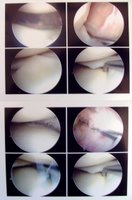
I’d love to tell you what’s going on in those pictures, but I’d be lying if I claimed to have a clue. The next thing I had a clue about was a nurse (who was German and must have been pretty as I started trying to talk German to her before I remembered that I can’t) gently waking me up and asking me how I was feeling.
I don’t remember being wheeled back to the day ward – I presume I fell asleep – but that’s where I ended up. I drifted in and out of sleep for an hour or two. I ate a sandwich. I chatted with the other patients as far as that was possible; it must have looked like a narcolepsy ward as we all kept drifting off mid-sentence.
What I did manage to glean was that the others had serious problems compared to mine. One was in the later (but far from final) stages of recovering from “An Alan Smith, but worse” while another had just had the same surgery as me, but only so they can then decide how best to go about repairing his torn cruciate ligament.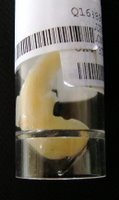 As I lay there thinking about how lucky I am that my recovery time will be so much shorter than either of theirs, I also thought about how, when it comes time to play the Olympic football match, I will definitely be playing in goal.
As I lay there thinking about how lucky I am that my recovery time will be so much shorter than either of theirs, I also thought about how, when it comes time to play the Olympic football match, I will definitely be playing in goal.
The surgeon arrived shortly after the last day patient was returned to his spot in the room and talked us each through how it had gone and what happens next. Mine went swimmingly. They removed what they had to remove (the “vast majority of the medial meniscus”), left what they could, and expected me to be in good shape when I come back to see them again in six weeks.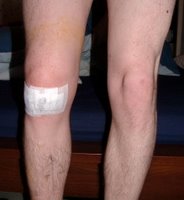 At the moment (as you can see) I’m not in such great shape – at least not to look at – but I’m definitely improving each day and have finally laid off the painkillers that would have made an earlier blog entry even more impenetrably dull. I suspect that the first consultant’s guess that I could be doing a bit of light jogging after two weeks might turn out to be somewhat optimistic, but it won’t be too much more than that I hope.
At the moment (as you can see) I’m not in such great shape – at least not to look at – but I’m definitely improving each day and have finally laid off the painkillers that would have made an earlier blog entry even more impenetrably dull. I suspect that the first consultant’s guess that I could be doing a bit of light jogging after two weeks might turn out to be somewhat optimistic, but it won’t be too much more than that I hope.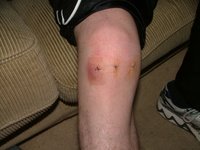 For now though, I’m hobbling about (with crutches if I’m going further than the fridge) very slowly and filled with even more admiration for the athletes in the Commonwealth Games than I was before I couldn’t bend my leg.
For now though, I’m hobbling about (with crutches if I’m going further than the fridge) very slowly and filled with even more admiration for the athletes in the Commonwealth Games than I was before I couldn’t bend my leg.
If the sight of all that naked, swollen, nasty flesh has you feeling slightly sick, there are some pictures of my niece looking cute at her christening last week here to make you feel better if you’re into that sort of thing.
Posted by John McClure at 12:55 pm 3 comments
It's Only the Commonwealths
 The Commonwealth Games – ‘diet Olympics’ to tide us over between the proper games – kicked off in Melbourne this week. There are several differences between these and the Olympic games: the countries that take part must be part of the Commonwealth, British competitors represent their home regions instead of Great Britain, some of the Olympic events aren’t included in the programme, and some events that don’t feature in the Olympics have pride of place in the Commonwealth games (rugby sevens, for example).
The Commonwealth Games – ‘diet Olympics’ to tide us over between the proper games – kicked off in Melbourne this week. There are several differences between these and the Olympic games: the countries that take part must be part of the Commonwealth, British competitors represent their home regions instead of Great Britain, some of the Olympic events aren’t included in the programme, and some events that don’t feature in the Olympics have pride of place in the Commonwealth games (rugby sevens, for example).
Without doubt, the athletes take these games very seriously – apart from anything else, the opportunity to compete in a games on this scale can only benefit athletes preparing for the Olympics in 2008 – but they’re just not the same.
It was summed up for me in a TV interview I saw with Chris Hoy a few nights ago. He said all the right things throughout the interview until the very end.
“You just hope that all your training will stand you in good stead. You hope to remain calm enough to get out there and perform like you know you can on the night. The last thing you want is to freeze up on the night when this is something you’ve been training for… for four years… effectively.”
That stray “effectively” gave him, and the importance of these games, away. He won the Olympic gold medal in the one kilometre time trial in the velodrome in Athens two years ago. Try as he might to convince us that he has been training for the Commonwealth title for four years, I’m fairly sure that three years ago, when he was getting up early and training his massive heart out all day, it was Athens 2004, not Melbourne 2006, he was thinking of when he was pushing through the pain barrier.
Further testament came after he eventually finished third in the 1km time trial. He was interviewed again, still slightly out of breath from his race. He gave it his all, he said. He couldn’t have asked for more, he said. He felt he did a good time for the conditions and was happy enough with his performance, he said. He didn’t say he wasn’t that bothered and that it was a good building block for the Olympics in two year’s time, but he might as well have done.
Jason Queally was similarly magnanimous having finished second. Himself a former Olympic gold medallist and world champion, he seemed remarkably full of smiles for a man who had just had to settle for his third Commonwealth silver in a row.
They both praised the winner and said they were happy for him. It was hard not to be. Australian Ben Kersten, having ridden third from last and taken the lead in front of a home crowd, could only sit and watch as the former Olympic and world champion (Queally) and then the reigning Olympic champion (Hoy) tried to better his time. When neither could, Kersten was rendered prostrate on the ground in floods of joyful tears.
Australian Ben Kersten, having ridden third from last and taken the lead in front of a home crowd, could only sit and watch as the former Olympic and world champion (Queally) and then the reigning Olympic champion (Hoy) tried to better his time. When neither could, Kersten was rendered prostrate on the ground in floods of joyful tears.
And therein lies my problem with the Commonwealth Games – they seemingly mean so much to some, while meaning much less to others. As delighted as I was to see the Australian’s reaction, there was still a bit of me whispering silently at the television “Calm down, mate; it’s only the Commonwealths.”
Having said all that, of course I’ve been glued to the TV since they started and will continue to be at every opportunity until they finish.
The Commonwealth Games always produce some wonderful stories and impressive feats - in beating England in the final to win the rugby sevens gold medal this morning, New Zealand maintained a remarkable unbeaten record in the history of that sport’s involvement in the games – and as cynical as I may sound about how important they are, for many young athletes (like Ben Kersten), this will be their first and biggest taste of a games of any sort.
They are special in their own way and, if they do nothing else, they highlight by way of contrast just how important the Olympics are.
For someone from Britain (or perhaps, in the spirit of the Commonwealth Games I should say ‘Northern Ireland’), another highlight is that when someone from the English team wins a gold medal, we don’t have to sit through that dreadful dirge of an anthem that entreats a God who has better things to do to save a woman who should be more than wealthy enough to be looking after herself.
Land of Hope and Glory is vastly superior, even if the ending sounds like it should segue into the theme from Star Wars.
***
My own athletic prowess has not improved any since last I wrote. I only have a few more days to wait before I finally get the surgery I need to fix my knee. A couple of weeks more taking it easy after that and then hopefully I'll be back to some kind of training in April.
On the plus side, I heard from one of the cyclists interviewed in Melbourne that he finds it extremely beneficial to his training to sleep for 12 hours a day. All this time I've been half an Olympic cyclist and I never knew it.
Posted by John McClure at 10:53 pm 8 comments
Bully's Special Prize
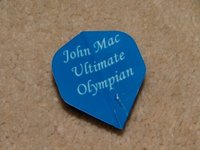 It has been a slow time for Olympic events of late - I'm injured, I'm lazy, I'm smoking again - all of which is not helpful when you're still 114 events short of your target. At least I have good friends though, one of whom (Mr van de Poll) very kindly bought me some sporting equipment for my birthday in an effort to get me motivated again. I think you'll agree, the man is inspired (see above).
It has been a slow time for Olympic events of late - I'm injured, I'm lazy, I'm smoking again - all of which is not helpful when you're still 114 events short of your target. At least I have good friends though, one of whom (Mr van de Poll) very kindly bought me some sporting equipment for my birthday in an effort to get me motivated again. I think you'll agree, the man is inspired (see above).
Unfortunately, said sporting equipment hasn't done much to motivate me away from my injured, lazy, smoking ways. The requirement to be in the pub when I'm using my new personailsed darts is slightly hampering my return to the straight and narrow, but what's a guy to do? I can't very well go letting John think I don't really appreciate the thoughtfulness of his gift now can I?
The more observant among you will notice from the tear in the flight featured above that I have at least been throwing said darts with great athleticism.
Surgery is still scheduled for next Tuesday. It will be a corner and I will turn it. I will stop smoking just as soon as I can go running every time I feel the urge to light up, and I will be back making a fool of myself in the name of raising money for Sobell House and entertaining you lot before you know it.
Posted by John McClure at 11:14 pm 0 comments
100th Post!
After 18 months of the challenge, this is the hundreth post. To celebrate, have some video footage of me falling out of a boat. The footage was shot by Tim last April in Nottingham. This was a racing canoe and the narrowest thing ever to be put in the water. I think I did well to make it the 40 yards I did before this happened.
Nice!
Posted by John McClure at 10:52 pm 11 comments
Lazy Bones
Every day when I get into work, just to ease myself into the day, I go online and surf to several of my favourite websites. Most days, there is something new there for me to look at – whether it’s a link to an interesting article (with an accompaniment of apposite comments from the members of the site) on Sportsfilter, a new statue photo on Stand By Your Statue, or a new set of amusing observations on one or other of my favourite blogs – it’s a rare day indeed when none of them have changed from the day before.
On those rare days however, I find myself feeling quite disappointed. I hadn’t realised until this morning that I may be inadvertently fuelling that sense of disappointment in others. This morning, I surfed to my own site – this site – and, forgetting momentarily that I am the sole contributor, felt disappointed that there wasn’t any new content since the last time I looked at it.
I don’t have much to tell you at the moment - I am still awaiting surgery on my knee (on 21st March), after which I will hopefully not take too long to get back to trying my hand at Olympic events – but it’s an unusual day indeed that I don’t have anything at all to say. As such, I have resolved to make this entry the first in what will hopefully become a Friday routine. No doubt, as the year progresses and I get back into training and eventing, there will be times when I need more than one post in the week, but from now on, loyal (and much abused) reader, regardless of other posts, there will always be one on a Friday.
Having said that I didn’t have much to tell you, I suppose there are a couple of things you might not know about (unless you know me personally – in which case you will be sick of hearing me bleating on about them).
This day last week, I got a call from BBC Radio Oxford at lunchtime to see if I would do a live interview with Sybil Ruscoe on the drivetime show at 4PM. Obliging sort (and media whore) that I am, I agreed to wander (or limp) up to the studio and spent a very pleasant half hour yacking on the radio with the sports-mad Ruscoe.
Statue John recorded the whole show in Real Player, and as soon as I can figure out how to edit out the bits I’m not in (and therefore make the file a manageable size), I will pop it online for you.
I’ve also started writing a monthly 200 words about what I’m doing for the Oxford Courier Journal – a local free newspaper. I’ll scan the first instalment over the weekend and put it on here. The second is due to be published soon.
Otherwise, all is fairly quiet. I’m getting frustrated with my injury now and 21st March seems a long time away. I’m assured that after the surgery I shouldn’t be out of action for more than three or four weeks, but it’s going to take time to build up muscle mass again, and I’ve been limping so long now, it seems odd to imagine walking any other way.
Essentially, I have fallen into the trap that all injured athletes must face. My knee injury should in no way have prevented me from lifting weights or even swimming with a leg float, but I have resorted instead to eating pies, smoking cigarettes and playing x-Box whilst lying on the sofa and feeling sorry for myself.
Part of the problem is getting around – I can get where I need to go, but the limping makes it take longer and tires me quickly – but in truth, that doesn’t seem like such a problem when it is a card game or a night on the beer I’m trying to get to instead of the gym or the pool.
Posted by John McClure at 5:45 pm 5 comments
There's a Hole in My Bucket

Having flown back from Dubai (where I failed miserably to get to the firing range) on Wednesday, I had an appointment with the knee expert yesterday. My MRIs were back and the diagnosis was complete. There's a hole in my bucket.
The image above demonstrates what a bucket handle tear of the medial meniscus looks like in cross-section from above. That's what I've probably had for quite some time, and have at this very moment.
The image below demonstrates what a displaced bucket handle tear of the medial meniscus looks like in cross-section from above. That's what happened when I knelt down to pull a plug out of a wall a few weeks ago.
My knee has improved a lot since that happened - in fact, my bucket handle tear is no longer displaced, which is obviously great - but I'm walking around on a time-bomb that may explode (or, to be more medically accurate, displace) at any moment.
In short, the cartilage has to come out, but it's not urgent. I've been given the all clear to go to the US and play golf next week as planned, but as soon as I get back, I need to get to the hospital and have an arthroscopy to remove the offending bucket and its dodgy handle.
I mentioned to the surgeon that I have rather a daunting athletic programme lined up in the months to come. He said that was fine, but only if it was a one off - I could probably make it through the training and running of a single marathon, but if I decided to take up marathon running long term, I'd be likely to have arthritis in my knee by the time I'm 35. Likewise, he said, contact sports like rugby or football would have to go too.
I almost found myself being upset by that, until I remembered that I loathe jogging and don't play either rugby or football.
I asked him if I could film the operation and post it on my website. He told me I was a freak, but he didn't say no.
I'm off this afternoon back to Belfast, then (on Sunday) I'm heading to the US with my dad to play some golf (bucket handle permitting) and do some hardcore relaxing. Having failed to find the time in Dubai to visit a shooting range, I will do my utmost to fire a gun while I'm in the states; I hear it's virtually mandatory.
Posted by John McClure at 11:51 am 8 comments
